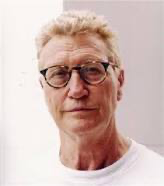Derek Boshier
British, (1937–2024)
Derek Boshier was born in Portsmouth in 1937. He went on to study at London’s Royal College of Art between 1959 and 1962, a period when his cohort also included David Hockney, R.B. Kitaj, and others who would come to define the British art scene in the coming years. Within the US, the country where he would ultimately end up, Boshier has not been so widely recognized as a key figure within the history of Pop. But in England, he is thought of as one of the movement’s core figures. In the eccentric 1962 documentary Pop Goes the Easel, Ken Russell created a portrait of the emergent movement by profiling four artists. One of them was Boshier, who appeared before Russell’s camera alongside Peter Blake and Pauline Boty. In 1980, Boshier moved to Texas to teach at the University of Houston. He continued to produce oddball art that earned him fame in the local scene. During the ’80s, he painted Klansmen, cowboys, and parodies of the art world, all using thick swaths of paint that owed something to the Neo-Expressionist movement of the day. The pile-up of symbols he added tended to confuse viewers. In a 1985 Artforum review, a befuddled Ed Hill and Suzanne Bloom wrote, “It is tempting to read this painting in the manner of an astral projection of hermeneutics, but perhaps it is our obsession that insists upon seeing these shards of orbiting culture as slowly turning tropes.” Boshier moved back to England in 1992, then returned to the US once more in 1997, remaining in Los Angeles for the rest of his career. He continued to produce art, expanding beyond painting, into mediums such as video and installation. The artist continued to work up until the very end, presenting new paintings as recently as this past spring at Los Angeles’s Night Gallery. His restlessness befit an artist whose motto was “Art ’Til You Drop.”
Source: ARTnews.com
British, (1937–2024)
Derek Boshier was born in Portsmouth in 1937. He went on to study at London’s Royal College of Art between 1959 and 1962, a period when his cohort also included David Hockney, R.B. Kitaj, and others who would come to define the British art scene in the coming years. Within the US, the country where he would ultimately end up, Boshier has not been so widely recognized as a key figure within the history of Pop. But in England, he is thought of as one of the movement’s core figures. In the eccentric 1962 documentary Pop Goes the Easel, Ken Russell created a portrait of the emergent movement by profiling four artists. One of them was Boshier, who appeared before Russell’s camera alongside Peter Blake and Pauline Boty. In 1980, Boshier moved to Texas to teach at the University of Houston. He continued to produce oddball art that earned him fame in the local scene. During the ’80s, he painted Klansmen, cowboys, and parodies of the art world, all using thick swaths of paint that owed something to the Neo-Expressionist movement of the day. The pile-up of symbols he added tended to confuse viewers. In a 1985 Artforum review, a befuddled Ed Hill and Suzanne Bloom wrote, “It is tempting to read this painting in the manner of an astral projection of hermeneutics, but perhaps it is our obsession that insists upon seeing these shards of orbiting culture as slowly turning tropes.” Boshier moved back to England in 1992, then returned to the US once more in 1997, remaining in Los Angeles for the rest of his career. He continued to produce art, expanding beyond painting, into mediums such as video and installation. The artist continued to work up until the very end, presenting new paintings as recently as this past spring at Los Angeles’s Night Gallery. His restlessness befit an artist whose motto was “Art ’Til You Drop.”
Source: ARTnews.com
Artist Objects
New York Times (Leisure Section) 2007.023


